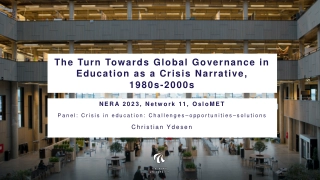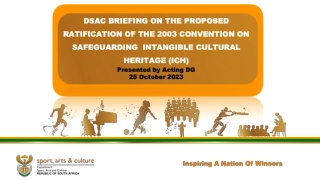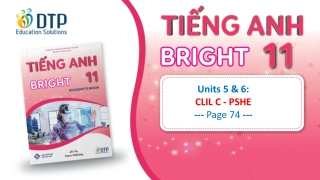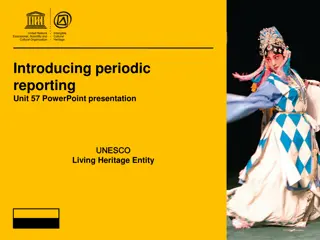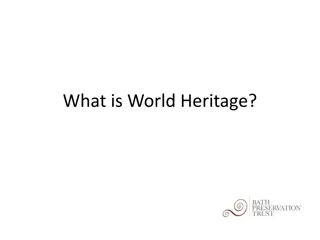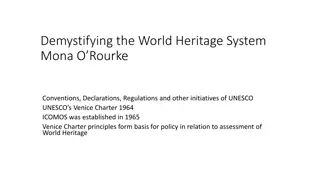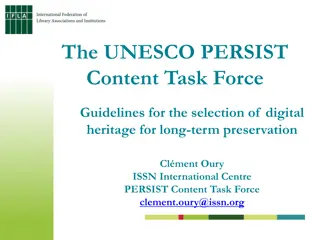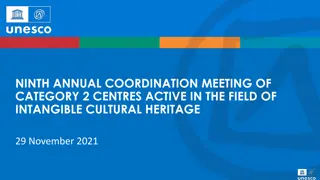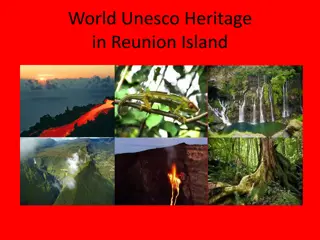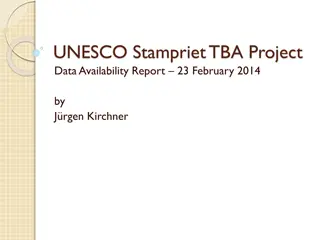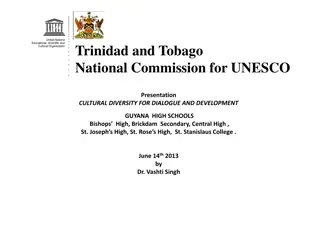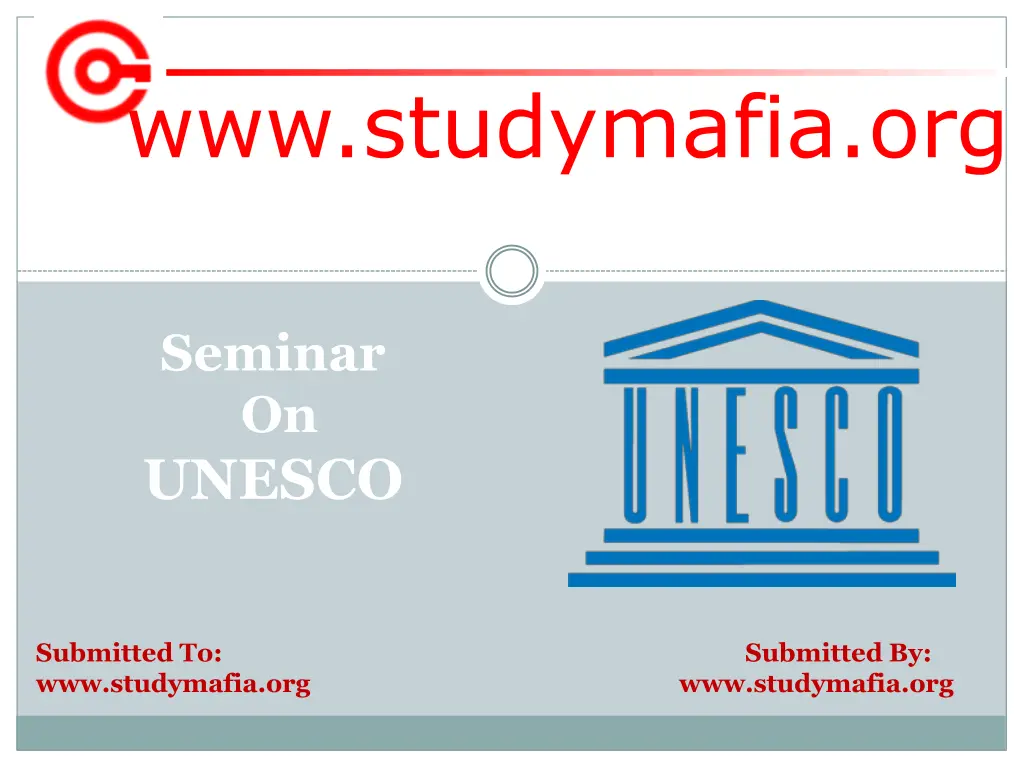
Understanding UNESCO's Role in Global Education and Cultural Preservation
Discover the significance of UNESCO - the United Nations Educational, Scientific and Cultural Organization - in promoting peace through international cooperation in education, science, and culture. Learn about UNESCO's initiatives in achieving the Sustainable Development Goals, including advocating for Education for Sustainable Development, global coordination efforts, priority action areas, and the 5 Ps of the 2030 Agenda.
Download Presentation

Please find below an Image/Link to download the presentation.
The content on the website is provided AS IS for your information and personal use only. It may not be sold, licensed, or shared on other websites without obtaining consent from the author. If you encounter any issues during the download, it is possible that the publisher has removed the file from their server.
You are allowed to download the files provided on this website for personal or commercial use, subject to the condition that they are used lawfully. All files are the property of their respective owners.
The content on the website is provided AS IS for your information and personal use only. It may not be sold, licensed, or shared on other websites without obtaining consent from the author.
E N D
Presentation Transcript
www.studymafia.org Seminar On UNESCO Submitted To: www.studymafia.org www.studymafia.org Submitted By:
Content What is UNESCO? Role of UNESCO GAP Global Coordination by UNESCO Priority Action Areas 5 Ps of the 2030 Agenda Harnessing partnerships Partner Networks Conclusion
What is UNESCO? UNESCO is the United Nations Educational, Scientific and Cultural Organization. It seeks to build peace through international cooperation in Education, the Sciences and Culture. UNESCO's programmes contribute to the achievement of the Sustainable Development Goals defined in Agenda 2030, adopted by the UN General Assembly in 2015.
Role of UNESCO Advocating for ESD at the international level Providing support to Member States in reorienting education Implementing and coordinating the Global Action Programme (GAP) on ESD Supporting key partners and projects Raising awareness and visibility
GAP Global Coordination by UNESCO Setting the ESD Global Agenda Building New Momentum: Launch Commitments Harnessing Partnerships: Partner Networks Fostering a Global Community of Practice: Global Forum and Online Clearinghouse Showcasing Good Practice: UNESCO-Japan Prize for ESD
Priority Action Areas Advancing policy Transforming learning and training environments Building capacity of educators and trainers Empowering and mobilizing youth Accelerating sustainable solutions at local level
5 Ps of the 2030 Agenda Planet: Respect and safeguard our common home Link with education to lessen environmental degradation and the impact of climate change People: Leave no one behind and attain sustainable livelihoods and lifestyles Include education in plans to help people fulfil their potential in dignity and equality and in a healthy environment Peace: Live in peaceful, diverse, harmonious societies, free from fear and violence Maximize education s potential to foster peaceful, just and inclusive societies Prosperity: Transform societies to have sustained, inclusive and sustainable economic growth, and sustainable lifestyles Utilize education to reduce poverty and stimulate green and inclusive economies Partnership: Strengthen global solidarity to achieve the SDGs Ensure adequate financing, policy coherence and multisector capacity
Education for Sustainable Development Goals Learning objectives concise guidance on learning content and approaches to teach key sustainable development challenges structured along the SDGs, providing age-specific learning content for each SDG address key competencies needed to implement the SDGs, as well as transformative pedagogies to teach them
Monitoring of Target 4.7 contribute to monitoring SDG Target 4.7 and provide inputs for overall monitoring of SDG 4 contribute to online database for reporting initiatives related to Target 4.7 develop thematic reports related to Target 4.7
Symposia on the Future of ESD cutting-edge debate on non-conventional questions about the future of ESD to plan ahead for the time after the GAP and to contextualize ESD within the SDGs 2 already have taken place: Omori (Japan) & Gelsenkirchen (Germany) 3 more to come in South Africa, Dubai, Latin America
Harnessing partnerships Partner Networks 2nd GAP Partner Network consultation meeting (July 2016, UNESCO HQ) 85 organizations from around the world are Key Partners developing flagship projects for each Priority Action Area
Timeline UNESCO World Conference on ESD launches the Global Action Programme (GAP) on ESD 2014 First meeting of Partner Networks Launch of online GAP ESD Clearinghouse 2015 Global Review Forum for the GAP on ESD Mid-term report on the GAP on ESD Progress report on GAP implementation to UNGA 72 2017 Global Review Forum for the GAP on ESD Final report on the 1stphase of the GAP on ESD 2019
Conclusion As we look to the future, it is essential to recognize the critical importance of UNESCO's mission in addressing the complex challenges facing humanity. From climate change to social inequality, from the preservation of cultural heritage to the advancement of education for all, UNESCO's mandate remains as relevant and vital as ever. In an increasingly interconnected world, where cultural exchange and mutual understanding are paramount, UNESCO's role in fostering dialogue and collaboration across borders is indispensable.
Reference www.google.com www.wikipedia.com www.studymafia.org www.seminarppt.com


